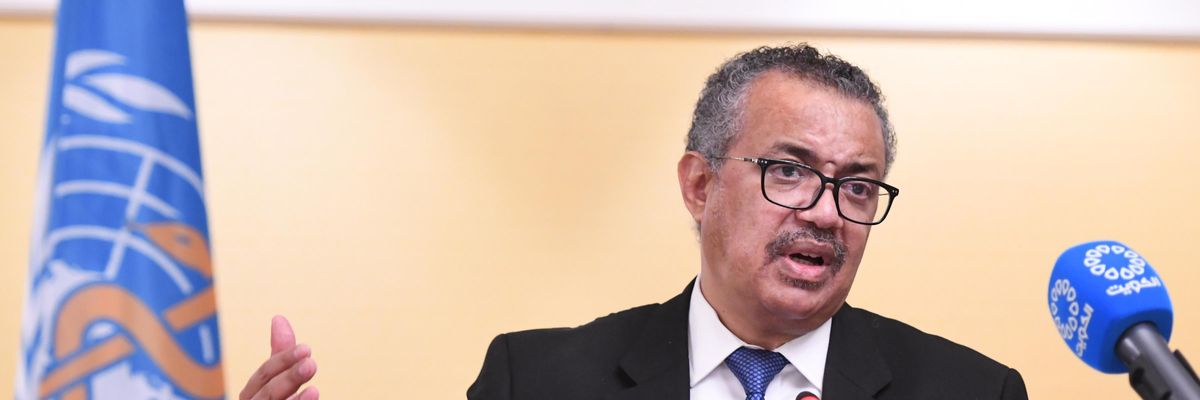As wealthy nations continue hoarding Covid-19 vaccine stockpiles and pharmaceutical corporations keep refusing to share vaccine technology, the head of the World Health Organization on Wednesday stressed that rich countries have the tools to end the pandemic, while warning of potentially deadlier mutations if action is delayed.
"At the time of writing, close to 10,000 people were recorded as dying every single day because of this virus. We can end this crisis, but only with the support of key countries and vaccine manufacturers."
"We can end the acute stage of this pandemic very quickly," WHO Director-General Tedros Adhanom Ghebreyesus writes in the journal PLOS Global Public Health. "Highly safe and effective vaccines have, for the moment at least, significantly weakened the link between cases and death in the countries with the highest vaccine coverage. This has allowed those countries, which have so far monopolized vaccine supply, to open up and enjoy a certain level of economic recovery."
However, the situation in the Global South is "far bleaker," he writes. "The 30 poorest countries in the world have fully vaccinated approximately just 2% of their populations. This is not even enough to vaccinate health workers who have been on the frontline of this pandemic, nor those at greatest risk. Compounded by the more transmissible Delta variant, this is translating to avoidable deaths, causing health systems to collapse and undermining the delivery of essential health services."
Tedros notes that the WHO warned last year "that vaccine nationalism would only prolong the pandemic and offered a number of ways for governments and companies to ensure the equitable manufacture and sharing of vaccine doses, including COVAX, a unique mechanism designed to pool the risks of developing vaccines, and their procurement."
"The two-track pandemic we are now witnessing could have been avoided but instead is being exacerbated," argues Tedros. "Some countries that have vaccinated the majority of their populations have already begun rolling out booster shots and some are also developing vaccine stockpiles. Even vaccines produced in Africa have been shipped to countries that have already vaccinated the majority of their populations."
The WHO chief is calling on all nations "to commit to the eminently feasible target of at least 40% vaccination coverage of their total population by the end of this year," which he believes is "more than possible, not least because of recent projections that highly vaccinated countries currently have 300 million stockpiled vaccines and this will be more than a billion by the end of the year."
"At a time of vaccine scarcity in the African continent and many other low- and lower-middle-income countries, this is morally repugnant and epidemiological madness," says Tedros. "At the time of writing, close to 10,000 people were recorded as dying every single day because of this virus. We can end this crisis, but only with the support of key countries and vaccine manufacturers."
Tedros recommends "five simple steps that if implemented now would save a lot of lives":
- Countries that have contracted high volumes of vaccines should swap near-term delivery schedules with COVAX and the African Vaccine Acquisition Trust (AVAT);
- Vaccine manufacturers should immediately prioritize and fulfill their contracts to COVAX and AVAT, and provide regular, clear supply forecasts;
- G7 and all dose-sharing countries must fulfill their pledges urgently, with enhanced pipeline visibility, sufficient product shelf life, and support for supplementary supplies;
- All countries must eliminate export restrictions and any other trade barriers on Covid-19 vaccines and the inputs involved in their production; and
- Solidarity. Getting this right takes leadership, economic capital, and a realization that for a fast-moving respiratory pathogen, the only way out is to do so together.
"As world leaders meet at the G20 Summit in Rome, there is an opportunity to outline a comprehensive plan to end the acute stage of this pandemic everywhere," writes Tedros. "The Delta variant has reinforced just how interconnected the world is and that new variants emerging anywhere are a threat everywhere."
"At a time of global vaccine scarcity, stockpiled vaccines will ironically make populations less safe by allowing the virus to rip through unvaccinated communities, giving it free rein to potentially mutate into a variant that can evade vaccines," warns Tedros. "The best way to protect people is to prioritize protecting everyone. The time for commitments has passed; the time to deliver is now."



